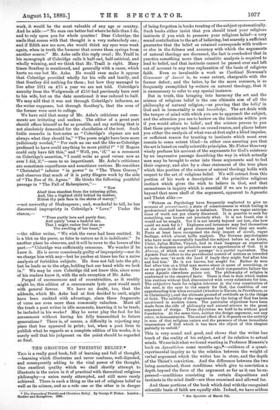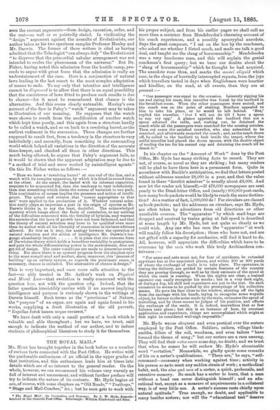THE GROUNDS OF THEISTIC BELIEF.*
TSB is a really good book, full of learning and full of thought, —learning which illustrates and never confuses, well-digested, and consequently adding to the vital power of the thought. One excellent quality which we shall shortly attempt to illustrate is the union in it of practical with theoretical religious philosophy—a union rarely attempted, and still more rarely achieved. There is such a thing as the art of religions belief as well as its science, and as a rule one or the other is in danger
• The Groundsof Theistic and Christian Belief. By George P. Fisher. London.. Hodder and Stoughton. 1884.
of being forgotten in books treating of the subject systematically. Such books either insist that you should trust your religions instincts if you wish to preserve your religious belief—a very sound contribution to the art of believing, but scarcely a sufficient guarantee that the belief so retained corresponds with truth— or else in the fulness and accuracy with which the arguments of natural theology are discussed, the fact is overlooked that in practice something more than scientific analysis is required to lead to belief, and that instincts cannot be passed over and left out of account in any true explanation of the basis of religious faith. Even so invaluable a work as Cardinal Newman's Grammar of Assent is, to some extent, chargeable with the former defect; and the latter, by far the more common, is so frequently exemplified by writers on natural theology, that it is unnecessary to refer to any special instance. But in truth, this bringing into harmony the art and the science of religious belief is the one ultimate aim of all the philosophy of natural religion,—as proving that the belief in God and in immortality is real knowledge. The art deals with the temper of mind with which you are to approach the subject, and the attention you are to bestow on the instincts within you if you would attain to belief; and the science proves to you that these precepts are based on sound reason, and places before you either the analysis of what was at first sight a blind impulse, or sufficient reason for trusting to instincts which must ever remain to some extent blind—in either case assuring you that the art is bailed on really scientific principles. Mr. Fisher thus very wisely prefaces his account of the arguments for God's existence by an impressive passage describing the way in which actually men may be brought to enter into these arguments and to feel their cogency, and also by a clear statement of the true place which this portion of the science of natural theology holds with respect to the art of religious belief. We will extract from this portion of his work a description of the primitive religious instinct which gives the wish to believe in God, and that earnestness in inquiry which is essential if we are to penetrate beyond that mere shell of the argument, apparent to Agnostic and Theist alike
" Writers on Psychology have frequently neglected to give an account of presentiment, a state of consciousness in which feeling is predominant and knowledge is indistinct. There are vague anticipa- tions of truth not yet clearly discerned. It is possible to seek for something, one knows not precisely what. It is not found, else it would not be sought. Yet it is not utterly beyond our ken, else how could we seek for it P Explorers and inventors may feel themselves on the threshold of great discoveries just before they are made. Poets at least have recognised the deep import of occult, vague feelings, which almost baffle analysis. The German psychologists who have most successfully handled the subject before us, as Lotze, IIIriei, Julius Muller, Vityscb, find in their language an expressive term to designate our primitive sense or apprehension of God. It is Ahnung, of which our word ' presage' is a partial equivalent. The Apostle Paul refers to the providential control of nations as intended to incite man to seek the Lord if haply they might feel after him and find him.' He is not known, but sought for. Rather do men feel after him as a blind man moves about in quest of something, or as we grope in the dark. The cause of their comparative failure the same Apostle elsewhere points out. The philosophy of religion is conformed to the observed facts. There is that in man which makes him restless without God, discontented with every substitute for him. The subjective basis for religion inherent in the very constitution of the soul, is the spur to the search for God, the condition of our apprehending him when revealed (whether in Nature, in Providence, or in Christianity), and the ultimate ground of certitude as to the things of faith. The validity of the arguments for the being of God has been questioned in modern times. The particular objections have been made from the side of philosophy and natural science to the great argument of design. These objections we hold to be without good foundation. At the same time, neither the design argument, nor any other, is demonstrative. The actual effect of it depends on the activity in mau of that religious nature and the presence of those immediate impressions of God which it has been the object of this chapter partially to unfold."
This is very sound and good, and shows that the writer has touch of the reality of his subject, and of its relation to actual minds. We see in it what we found wanting in Professor Momerie's bock on Agnosticism some months ago,'—evidence of a quasi- experimental inquiry as to the relation between the weight of verbal argument which the writer has in store, and the depth of the Theist's conviction. And the difference between the two being ascertained, those conditions which give to conviction a depth beyond the force of the argument so far as it can be ex- pressed—conditions consisting in certain dispositions and instincts in the mind itself—are thus examined and allowed for.
And those portions of the book which deal with the recognised scientific basis of faith are equally able. Indeed, we have seldom
• See Spectator of March 7th.
seen the current arguments—from design, causation, order, and the rest—so well or so pointedly stated. In vindicating the " design " argument against the assaults of Evolutionists, our author takes as his two specimen samples Professor Huxley and Mr. Darwin. The former of these writers is cited as having admitted that the Teleologist " can always defy " the Evolutionist "to disprove that the primordial nebular arrangement was not intended to evolve the phenomena of the universe." But Dr. Fisher, having noted this admission from the hostile camp, pro- ceeds to argue with great force that the admission is really an understatement of the case. Here is a conjunction of natural laws leading in the last resort to the most complex adaptation of means to ends. To say only that intention and intelligence cannot be disproved is to allow that there is an equal possibility that the coexistence of laws fitted to produce such results is due to chance—for it must be remembered that chance is the alternative. And this seems clearly untenable. Huxley's own account of the flaw in Paley's " watch " argument may be taken in illustration of our meaning. He supposes that the watch were shown to result from the modification of another watch which kept time poorly, and this again from a structure hardly to be called a watch, and so on back to a revolving barrel, as the earliest rudiment in the succession. These changes are further supposed to result first, from a tendency in the structure to vary indefinitely; and secondly, from something in the surrounding world which helped all variations in the direction of the accurate time-keeper, and checked all those in other directions. This much being allowed, he argues that Paley's argument fails, as it would be shown that the apparent adaptation may be due to " a method of trial and error worked by unintelligent agents." On this Dr. Fisher writes as follows :—
" Here we have a revolving barrel' at one end of the line, and a watch with its complex apparatus, by which it is fitted to record time, at the other. At the outset, the barrel with its inherent capacities, requires to be accounted for, then the tendency to vary indefinitely. then that something which limits the course of variation to one path, This combination of means implies the presence and action of intelli- gence. The aotnal end evinces that means appropriate to that end' were applied to the production of it. Whether natural selec- tion really plays so important a part in the origin of species as Mr. Darwin thinks is, to say the least, doubtful. The acknowledged mystery which hangs about the facts of correlation, to say nothing of the difficulties connected with the fertility of hybrids, may warrant the surmise that the laws of growth have not been fathomed, and that the theory of natural selection may have to be qualified even more than its author with all his liberality of concession in his later editions allowed. Be this as it may, the analogy between the operation of natural selection and the action of intelligence Mr. Darwin's lan- guage abundantly implies It is plain that the extreme form of Darwinian theory which holds a boundless variability in protoplasm, and puts the whole differentiating power in the environment, does not get rid of design. The outer conditions are made to determine every- thing. But since there is an upward progress from the simplest eyes to the most complicated and perfect, since,"moreover, this 'process of building' up an orderly system, as regards the proximate cause, is necessary, chance is excluded. The alternative of chance is design."
This is very important, and once more calls attention to the fact—so ably treated in Mr. Arthur's work on Physical and Moral Law—that evolution is really concerned with the question how, not with the question why. Indeed, that the latter question irresistibly carries with it an answer implying intelligence and purpose is curiously shown in the writings of Darwin himself. Such terms as the " provisions " of Nature, the " purpose " of an organ, are again and again found in his works, supplying a fresh illustration of the old proverb, " Expellas furctl, tamen usque recurret."
We have dealt with only a small portion of a book which is valuable and able throughout ; but we have, we trust, said enough to indicate the method of our author, and to induce students of philosophical literature to study it for themselves.



































 Previous page
Previous page